QuestionI have a betta that I "rescued" about a week ago. When I acquired him, he was in a small bowl. He has three "bald" circles in his ventral fin, and "balding" of the ends of his tail fin. The "balding" seems to be progressing. His fins do not appear shredded. I have not noticed him itching or rubbing on his furnishings. His appetite is not great- I put about 4 pellets of betta food in with him daily- he does not eat them when I put them in, and I cannot tell for sure if he eats them before they disintegrate. I have relocated him into a 1 1/2 gal acrylic tank with two plastic plants and some glass rocks. Based on my research, it would appear that he has fin rot. Does that fit with your experience? If so, how should I treat it? Do I need to put a heat source (lamp) over his tank? He is a beautiful fish- a golden orange color, and I would really like to try to save him. Any suggestions you have for treatment, and basic care, would be greatly appreciated. Also, is there something in particular I may give him that may tempt him to eat?
AnswerHi Angie,
Fungus, is almost always due to poor water conditions. Bettas in small bowls should have their water changed twice a week. It is so sad to see how some people keep bettas. Bless your heart for rescuing him.
I would buy a cure for fungus as quickly as possible. Jungle Fungus eliminator is one product you could use. It is very effective against fungus. I would also add 1/2 teaspoon diluted aquarium salt to his water.
Here is some information on Bettas that you might find interesting, and may help you understand the Betta a little more:
Bettas need 5 gallons of water or more to be healthy, and happy.
In their habitat the betta may live in shallow waters, but they have lots of room to swim.
Keeping Bettas in small bowls, containers, vases, mirror tanks, etc. is cruel. The Betta is one of the most mistreated fish on the market.
They need a heated tank. Temperature should be 78-80 degrees. They are tropical fish, and are cold under this temperature. Cold bettas get sick, are miserable, and live unhappy lives. ( Always remember when heating a tank, do this very very slowly..1 (one) degree every two days, as bringing up the temperature too fast would be deadly to your Betta.) Put your Betta in the same degree water he is in now, and bring the temperature up very very slowly. The temperature should always be stable. Fluctuating temperature is very bad for bettas, and any other fish.
They should have a silk plant in their tanks, so that they can rest on the leaves. They also need a little tunnel or some knick knack that they can go through. One teaspoon to five gallons of diluted aquarium salt may be added to his water.
Aquarium salt helps them with stress, and helps with parasites. However if a Betta is showing signs of a swollen tummy, salt should not be used.
They need a varied diet. This is very important. Betta pellets one day, Betta Flakes the next, Daphnia the next, and bloodworms should be given once a week as a treat.
He should be given one frozen cooked pea a week, and on the day you give him the pea, he should fast.
A betta is prone to constipation, and constipation leads to Swim Bladder Disease. A cooked frozen cooked pea a week keeps them from getting constipated. Always remove the outer layer of the pea, and cut it into small pieces feeding it to your betta one piece at a time.
They should have 2-3 small meals a day, and not one big meal. We must remember that their tummy is the size of their eye.
Example: 2 pellets for one meal.
Water changes are very important. Water changes must be made every week without fail with a good water conditioner such as Aqua Safe or Stress Coat. There is also a conditioner made especially for bettas. If you do not have a filter, change all the water in his tank weekly.
Never put two bettas in the same tank, they will kill each other...male or female. The Betta male is a loner. Females can be kept together in a big enough tank, but they are also aggressive towards each other, and the tank should be at least 30 gallons with many hiding places.
When treated well, a betta can live up to 8 years, if you buy him when he is very young. (Unfortunately we do not know their age when we buy them at the Pet Store which is why some bettas die two or three years after we have bought them.)
He's an intelligent little fish, and should be treated with kindness.
Too many vendors know nothing about the betta, and don't care...so don't give good information on how to keep them.
They are there to sell, and will say anything just to make a buck. They send you home with your bought betta, telling you a small bowl is perfect, and bloodworms! The poor customer thinks he has everything he/she needs, and then the fish gets sick, money is spent to cure him, and eventually the fish dies.
This turns my stomach over. Unfortunately there are no laws to protect fish.
Bettas kept in small bowls, one gallon tanks, and vases, will get sick, and are very hard to cure in such little water. They end up dieing, and
that hurts the person who has grown so attached to them. They don't deserve to be treated this way.
This is how a Betta should be treated. If treated this way, you will have your friend for a long long time. I breed them, love them, and know what is good for them.
If you have anymore questions, do not hesitate to write me.
Lynda

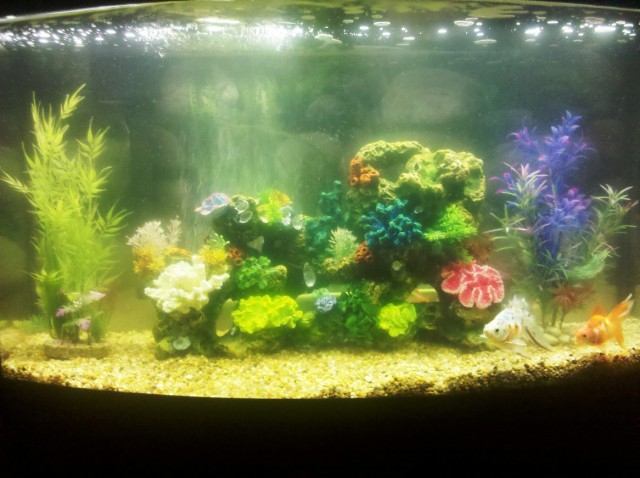 My tank water is green - help!
QuestionMy Tank
QUESTION: Hi,
I have a 46 gallon
My tank water is green - help!
QuestionMy Tank
QUESTION: Hi,
I have a 46 gallon
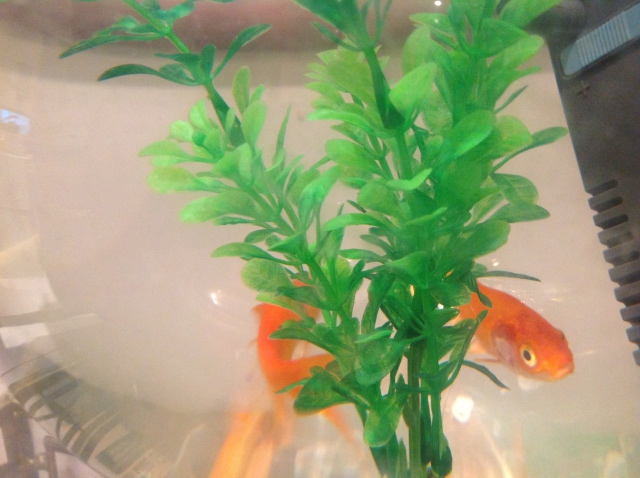 Gold fish
QuestionQUESTION: hi!
I am keeping gold fish for last m
Gold fish
QuestionQUESTION: hi!
I am keeping gold fish for last m
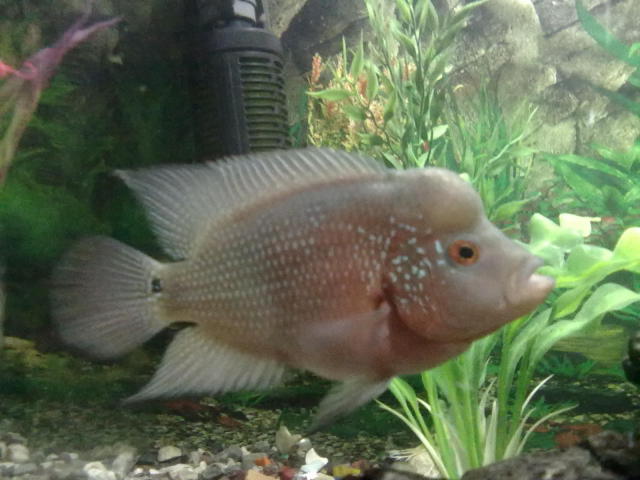 flower horn disease
Question
my flower horn
hey, i am new in this hobby and
flower horn disease
Question
my flower horn
hey, i am new in this hobby and
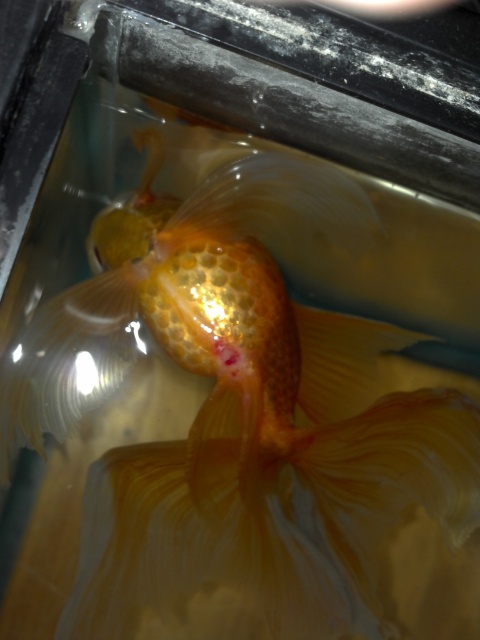 goldfish floating upside down...help please!
QuestionShirley1
QUESTION: My daughters goldfish
goldfish floating upside down...help please!
QuestionShirley1
QUESTION: My daughters goldfish
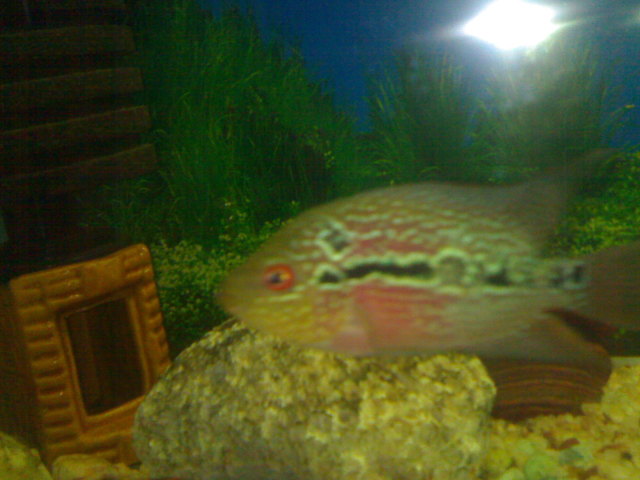 hump head
QuestionQUESTION: i am having four flowerhorns, each of
hump head
QuestionQUESTION: i am having four flowerhorns, each of